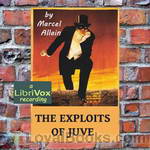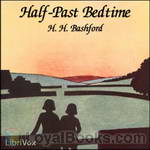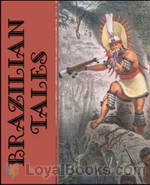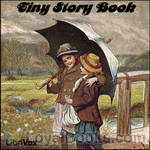|
Books Should Be Free Loyal Books Free Public Domain Audiobooks & eBook Downloads |
|
|
Books Should Be Free Loyal Books Free Public Domain Audiobooks & eBook Downloads |
|
Literature |
|---|
|
Book type:
Sort by:
View by:
|
By: William Frend De Morgan (1839-1917) | |
|---|---|
 Somehow Good
Somehow Good
A mysterious man arrives in London and, in a freak accident, gets electrocuted on an underground train and loses his memory. A young lady called Sally Nightingale feels responsible, and brings him home to her mother. But in a strange twist of fate it transpires that her mother is the man's ex wife, whom he left twenty years earlier in unhappy circumstances. The old attraction is there, but what will happen if and when his memory returns? A highly melodramatic plot, but with a deft comic touch, a host of vibrant characters, and a large dash of romance... | |
By: Sidney Lanier (1842-1881) | |
|---|---|
 The Song of the Chattahoochee.
The Song of the Chattahoochee.
Sidney Clopton Lanier was an American musician, poet and author. He served in the Confederate army, worked on a blockade running ship for which he was imprisoned (resulting in his catching tuberculosis), taught, worked at a hotel where he gave musical performances, was a church organist, and worked as a lawyer. As a poet he used dialects. He became a flautist and sold poems to publications. He eventually became a university professor and is known for his adaptation of musical meter to poetry. Many schools, other structures and two lakes are named for him. | |
 My Springs
My Springs
LibriVox volunteers bring you 9 recordings of My Springs by Sidney Lanier. This was the Fortnightly Poetry project for April 7th, 2013. This rather lovely poem is the poet's tribute to his wife's eyes. | |
By: Frederick Arnold Kummer (1873-1943) | |
|---|---|
 Film of Fear
Film of Fear
(Written under the pseudonym, Arnold Fredericks.) Ruth Morton is a world-renowned film actress who seems to have it all: youth, beauty, wealth, and a viable career. But she soon becomes the target of a malicious stalker who begins sending her a series of cryptic threats. Dismissed at first, the stalker soon emerges as a legitimate -- and mysterious -- threat. She soon must call for the services of Richard and Grace Duvall, a husband and wife detective team who soon find themselves ensnared in a mystery where everyone soon becomes a target. | |
By: Robert Louis and Fanny van de Grift Stevenson | |
|---|---|
 More New Arabian Nights: The Dynamiter
More New Arabian Nights: The Dynamiter
More New Arabian Nights: The Dynamiter (1885) is a collection of linked short stories by Robert Louis Stevenson and Fanny Vandegrift. Three gentlemen of little means and no occupation meet in the Bohemian Cigar Divan, a tobacco shop with couches to sit and smoke. They read of a reward offered for information as to the whereabouts of a man with big moustaches and a sealskin coat. They agree among themselves that they will separate and search for the man so as to claim the reward. The stories that follow concern their adventures... | |
By: Willis George Emerson (1856-1918) | |
|---|---|
 Smoky God or a Voyage to the Inner World
Smoky God or a Voyage to the Inner World
The Smoky God, or A Voyage Journey to the Inner Earth is the narrative of an aged Norwegian sailor compelled before he dies to tell the story of how he found a passageway to the center of the earth and discovered a world peopled with giants. | |
By: Sarath Kumar Ghosh (1883-?) | |
|---|---|
 Wonders of the Jungle
Wonders of the Jungle
How do elephants drink? What is the Law of the Jungle at the water hole? How does an elephant baby learn to feed and learn to swim? How do they walk under water? In what order do buffaloes drink? How do buffaloes fight the tiger? These and other wild inhabitants of the Indian jungle such as pigs, wild dogs, deer, camels, bears and birds are discussed in lively stories to entertain but mainly educate children of school age. "One of the great thinkers of the world has said that all the sciences are embodied in natural history... | |
By: Laurence Hope (1865-1904) | |
|---|---|
 Hira-Singh's Farewell to Burmah
Hira-Singh's Farewell to Burmah
Adela Florence Nicolson was an English poet who wrote under the pseudonym Laurence Hope. She was born in England and joined her father in 1881, who was employed in the British Army at Lahore (The traditional capital of Punjab for a millennium, Lahore was the cultural centre of the northern Indian subcontinent which extends from the eastern banks of the Indus River to New Delhi.) Her father was editor of the Lahore arm of The Civil and Military Gazette, and it was he who in all probability gave Rudyard Kipling (a contemporary of his daughter) his first employment as a journalist... | |
By: Marcel Allain (1885-1969) | |
|---|---|
 The Exploits of Juve
The Exploits of Juve
Fantômas was introduced a few years after Arsène Lupin, another well-known thief. But whereas Lupin draws the line at murder, Fantômas has no such qualms and is shown as a sociopath who enjoys killing in a sadistic fashion.He is totally ruthless, gives no mercy, and is loyal to none, not even his own children. He is a master of disguise, always appearing under an assumed identity, often that of a person whom he has murdered. Fantômas makes use of bizarre and improbable techniques in his crimes, such as plague-infested rats, giant snakes, and rooms that fill with sand... | |
By: Lucy Larcom (1824-1893) | |
|---|---|
 A New England Girlhood: Outlined From Memory
A New England Girlhood: Outlined From Memory
Lucy Larcom was an American poet, teacher, and mil-worker. According to Wikipedia: "Larcom served as a model for the change in women's roles in society." This is her colorful autobiography. Here, she tells about her happy childhood, and her time working in the mill. Along the way, she speaks about topics like morality, independence, love and loss inside a family, a strong belief in god, and the effects of being poor. Fans of Gene Stratton Porter, Fanny Fern and Susan Warner, and Ella Wheeler Wilcox will be delighted with this book. Lucy's sunny personality makes this book a very uplifting and interesting read. | |
By: Adelaide Anne Procter (1825-1864) | |
|---|---|
 Three Rulers
Three Rulers
Adelaide Anne Procter was an English poet and philanthropist. She worked prominently on behalf of unemployed women and the homeless, and was actively involved with feminist groups and journals. She became unhealthy, possibly due to her charity work, and died of tuberculosis at the age of 38. Procter's literary career began when she was a teenager; her poems were primarily published in Charles Dickens's periodicals Household Words and All the Year Round and later published in book form. Her charity work and her conversion to Roman Catholicism appear to have strongly influenced her poetry, which deals most commonly with such subjects as homelessness, poverty, and fallen women... | |
By: Adam Lindsay Gordon (1833-1870) | |
|---|---|
 Song of Autumn
Song of Autumn
Adam Lindsay Gordon was an Australian poet, jockey and politician. | |
By: William J. Lampton (1851-1917) | |
|---|---|
 Flag and the Faithful
Flag and the Faithful
LibriVox volunteers bring you 12 recordings of The Flag and the Faithful by William J. Lampton. This was the Weekly Poetry project for January 20, 2013.William J. Lampton was the second cousin of Jane Clemens (the youngest of the three daughters of Samuel Langhorne Clemens, better known by his pen name Mark Twain.)He launched his jounalist carreer in 1877 by starting the Ashland (Kentucky) Weekly Review, with his father’s money. Lampton wrote several book, as well as humorous poems he called 'yawps'. These were printed in the New York Sun and published in Yawps and Other Things ca. 1900. | |
By: Joseph Rodman Drake (1795-1820) | |
|---|---|
 Culprit Fay and Other Poems
Culprit Fay and Other Poems
A collection, The Culprit Fay and Other Poems, was published posthumously by his daughter in 1835. His best-known poems are the long title-poem of that collection and the patriotic "The American Flag" which was set as a cantata for two soloists, choir and orchestra by the Czech composer Antonin Dvořák in 1892-93, as his Op. 102. In the early part of the 19th Century both Drake and his friend Halleck were widely hailed by Americans as among the leading literary personalities and talents produced by this country... | |
By: Dhan Gopal Mukerji (1890-1936) | |
|---|---|
 Kari the Elephant
Kari the Elephant
The adventures of an Indian boy and his beloved elephant. Born near Calcutta, Mukerji won the Newbury Medal for children's fiction. | |
By: Unknown | |
|---|---|
 Fall of the Nibelungs
Fall of the Nibelungs
"The Fall of the Nibelungs" is Margaret Armour's plain prose translation from the middle high German of the "Nibelungenlied", a poetic saga of uncertain authorship written about the year 1200. The story is believed by many to be based on the destruction of the Burgundians, a Germanic tribe, in 436 by mercenary Huns recruited for the task by the Roman general Flavius Aëtius. The introduction to the 1908 edition summarizes the story, "And so 'the discord of two women,' to quote Carlyle, 'is as a little... | |
By: Steele Rudd (1868-1935) | |
|---|---|
 On Our Selection
On Our Selection
The humorous account of Dad and Dave and the rest of the Rudd clan as they attempt to carve a farming 'selection' out of the Australian wilderness in spite of fire, famine, snakebite, and a loony hired hand. | |
By: Edna Lyall (1857-1903) | |
|---|---|
 The Autobiography of a Slander
The Autobiography of a Slander
The Autobiography of a Slander exposes the consequences of reckless words or, even worse, intentionally disparaging words. In this moral tale, told from the point of view of "the slander", Edna Lyall (pseudonym used by Ada Ellen Bayley) reveals her ideals and goals in life and relationships. | |
By: Rosanna Eleanor Leprohon (1829-1879) | |
|---|---|
 Afternoon in July
Afternoon in July
LibriVox volunteers bring you 14 recordings of An Afternoon in July by Rosanna Eleanor Leprohon. This was the Fortnightly Poetry project for July 7, 2013.Rosanna Eleanor Leprohon, born Rosanna Eleanor Mullins, was a Canadian writer and poet. She was "one of the first English-Canadian writers to depict French Canada in a way that earned the praise of, and resulted in her novels being read by, both anglophone and francophone Canadians."Leprohon's novels were popular in both English and French Canada in the late 19th-century, and were still being reprinted in French in the mid-1920s... | |
By: Jessie Fothergill (1851-1891) | |
|---|---|
 The First Violin
The First Violin
May Wedderburn is a quiet provincial girl, living in small and seemingly boring Skernford. Underneath the dull exterior, there is mystery, suspicion and fear in this little town, surrounding the austere local wealthy landowner who is very interested in marrying poor May. It looks as though she will have to marry him whether she likes it or not until an unsuspected alliance is formed between her and a respected old lady. They both escape to Germany where music and excitement await them. | |
By: Lenore Elizabeth Mulets (1873-?) | |
|---|---|
 Stories of Birds
Stories of Birds
This volume contains stories, poems, myths, and facts about lots of different birds, intended for teaching children. It is divided into nine parts, each covering a different type of bird. | |
By: Christopher Morley (1890-1957) | |
|---|---|
 In the Sweet Dry and Dry
In the Sweet Dry and Dry
Written just before Prohibition to entail the possible troubles that might happen en route. Both sides of the argument, or battle as the case may be, strike out with various over-top methods like legislating most fruits and vegetables as unsafe or intoxicating large groups with breathable alcohol. | |
By: Rosa Campbell Praed (1852-1935) | |
|---|---|
 Lady Bridget in the Never-Never Land
Lady Bridget in the Never-Never Land
Following a failed love affair in England, Lady Bridget O'Hara accepts an invitation to travel to colonial Australia as companion to Lady Rosamund Tallant, the wife of the newly-appointed governor of Leichardt's Land. In Leichardt's Town, Lady Bridget, also known as Biddy, is reunited with her old friend and collaborator, Joan Gildea, special correspondent for The Imperialist newspaper. While visiting Joan, Biddy meets Colin McKeith, a roughly-hewn, Scottish-born pioneer, drover, miner, sometime-politician, and magistrate in the north-eastern colony... | |
By: Mary Ella Lyng | |
|---|---|
 History Plays for the Grammar Grades
History Plays for the Grammar Grades
A charming collection of 14 short American history plays for the very young - ranging from Christopher Columbus to George Washington to Susan B Anthony. | |
By: William Vaughn Moody (1869-1910) | |
|---|---|
 Harmonics
Harmonics
William Vaughn Moody was an American dramatist and poet. Author of The Great Divide, first presented under the title of The Sabine Woman at the Garrick Theatre in Chicago on April 12, 1906. Moody's poetic dramas included The Masque of Judgment (1900), The Fire Bringer (1904), and The Death of Eve (left undone at his death). He taught English at Harvard and Radcliffe until 1895, when he went to Chicago where he was an instructor at the University of Chicago, and from 1901 to 1907 assistant professor of English and rhetoric. | |
By: H.H. Bashford (1880-1961) | |
|---|---|
 Half-Past Bedtime
Half-Past Bedtime
Ah, the wonderful adventures of Marian after she meets the strange Mr. Jugg. "And who are you, Mr Jugg?" she inquired. "I'm the King of the Bumpies," he replied. When Marian was puzzled there came a little straight line, exactly in the middle, between her two eyebrows. "What are bumpies?" she said. "My hat!" he gasped. "Haven't you ever heard of bumpies?" Marian shook her head. "Oh dear, oh dear!" he sighed. "Have you ever heard of angels?" "Well, of course," said Marian. "Everybody's heard of angels... | |
By: Jane Barlow (1857-1917) | |
|---|---|
 Strangers at Lisconnel
Strangers at Lisconnel
Strangers at Lisconnel is a sequel to Jane Barlow’s Irish Idylls. The locations and most of the characters are common to both. There is great humor and concomitantly a certain melancholy in most of these stories of the most rural of rural places in Ireland. Although of a higher social class than her characters, Our Jane seems to have a touch of softness in her heart for their utter simplicity, abject poverty and naiveté. From the following brief example of dialogue, can be seen that Ms Barlow could only have come to write these words after having heard them countless times in person: Mrs... | |
By: Lucy S. Furman (1869-1958) | |
|---|---|
 Mothering on Perilous
Mothering on Perilous
Cecelia Loring is alone in the world after the death of her mother and has come to the Kentucky mountains in search of work. Although very depressed from her loss she soon becomes caretaker of the garden at a school and not many days later finds herself quite busy as housemother to a group of energetic boys that keep running away from the school because of homesickness, especially Nucky, who seems to have the weight of the world on his shoulders, worrying about not being at home to help his brother Blant "keep lookout" for the Cheevers, who have been at war with the Marrses for years over a piece of land... | |
By: Alfred Lawson (1869-1954) | |
|---|---|
 Born Again
Born Again
"I doubt that anyone who reads [Born Again] will ever forget it: it is quite singularly bad, with long undigestible rants against the evils of the world, an impossibly idealistic Utopian prescription for the said evils, and - as you will have gathered - a very silly plot." - oddbooks.co.ukAlfred Lawson was a veritable Renaissance man: a professional baseball player, a luminary in the field of aviation, an outspoken advocate of vegetarianism and economic reform, and the founder of a pseudo-scientific crackpot philosophy called Lawsonomy... | |
By: Edward Woodley Bowling (1837-1907) | |
|---|---|
 Climber's Dream
Climber's Dream
Edward Woodley Bowling was apparently a rector at the Church of All Saints in Houghton Conquest, Bedfordshire, England in the late 1800's, this poem is taken from Sagittulae, Random Verses. In this book's introduction he writes "The general reader will probably think that some apology is due to him from me for publishing verses of so crude and trivial a character. I can only say that the smallest of bows should sometimes be unstrung, and that if my little arrows are flimsy and light they will, I trust, wound no one." | |
By: Various | |
|---|---|
 Favorite Chapters Collection
Favorite Chapters Collection
All of us have our own favorite parts of a book which we love to read and re-read. The nicest part of this is that each time you read, you find something new to savor and remember. For those of us who haven't read some of the classics, a teaser in the form of a single chapter would probably be intriguing enough to want us to take up the book and start reading. Favorite Chapters Collection 001 is one such delicious tasting table! Ten chapters from some of the best known classics in English are available here and they're sure to delight not only those who have read the entire book but also those who are yet to do so... | |
By: Anonymous | |
|---|---|
 An Englishwoman's Love-Letters
An Englishwoman's Love-Letters
It need hardly be said that the woman by whom these letter were written had no thought that they would be read by anyone but the person to whom they were addressed. But a request, conveyed under circumstances which the writer herself would have regarded as all-commanding, urges that they should now be given to the world; and, so far as is possible with a due regard to the claims of privacy, what is here printed presents the letters as they were first written in their complete form and sequence. From book explaination | |
By: Joseph Hocking (1860-1937) | |
|---|---|
 Weapons of Mystery
Weapons of Mystery
Justin Blake receives an invitation from his old school-fellow Tom Temple to join him and his family for the Christmas holidays in Yorkshire. Having no other plans, he decides to go. Though he is normally much the opposite of what would be called a lady's man, he falls instantly in love with Miss Forrest, one of the guests, who had already shared his train compartment on the way. When he meets the mysterious Herod Voltaire and finds that he must protect the girl from him and his weapons of mystery, the adventure begins. | |
By: Various | |
|---|---|
 Buddhist Writings
Buddhist Writings
An anthology of Buddhist scriptures, appropriate as an introduction to its vast literature, or as a sampler for those who want to better understand Buddhism. The selections in this anthology are primarily from the Theravada school of Buddhism. | |
By: Edward Phillips Oppenheim (1866-1946) | |
|---|---|
 The Cinema Murder
The Cinema Murder
Phillip Romilly is a poor art teacher in London. He finds out that his wealthy cousin Douglas has been seeing his girl friend Beatrice behind his back. He strangles Douglas, throws him in the canal, and assumes his identity. Douglas had booked passage to America for the next day, so after a pleasant sea voyage Phillip arrives at the Waldorf Hotel in New York as Douglas Romilly. An hour after checking in he disappears again, and assumes yet another identity, one that his cousin had set up for himself. Douglas was facing massive financial problems, and he, too, had planned to avoid his problems by getting lost in the crowd in New York. Now, in chapter two…. | |
By: Unknown | |
|---|---|
 Sir Gawain and the Green Knight
Sir Gawain and the Green Knight
Sir Gawain and the Green Knight is a late 14th Century Middle English alliterative romance outlining an adventure of Sir Gawain, a knight of King Arthur’s Round Table. In the tale, Sir Gawain accepts a challenge from a mysterious warrior who is completely green, from his clothes and hair to his beard and skin. The “Green Knight” offers to allow anyone to strike him with his axe if the challenger will take a return blow in a year and a day. Gawain accepts, and beheads him in one blow, only to have the Green Knight stand up, pick up his head, and remind Gawain to meet him at the appointed time... | |
By: Anonymous | |
|---|---|
 Eirik the Red's Saga
Eirik the Red's Saga
In this saga, the events that led to Eirik the Red’s banishment to Greenland are chronicled, as well as Leif Eirikson’s discovery of Vinland the Good (a place where wheat and grapes grew naturally), after his longboat was blown off-course. By geographical details, this place is surmised to be present-day Newfoundland, and is likely the first European discovery of the American mainland, some five centuries before Christopher Columbus’s journey. | |
By: Various | |
|---|---|
 Brazilian Tales
Brazilian Tales
“Brazilian Tales” is a collection of six short stories selected by Isaac Goldberg as best representative of the Brazilian Literature of his period – the end of the 19th century. His comprehensive preface aims at familiarizing the reader with a literature that was – and still is – virtually unknown outside the boundaries of its own land, and the pieces chosen by Goldberg to be translated belong to writers that reached popularity and appreciation while still alive. This “pioneer volume”, as the translator himself puts it, still keeps its charm and interest as a way of offering to the English speaking public some “sample cases” of Brazilian Literature. | |
By: Unknown | |
|---|---|
 James Joyce in Context: Telemachus
James Joyce in Context: Telemachus
Collection of various works which James Joyce quotes and references to in his epic novel Ulysses, and provides them in audio form. Perfect for Joyce scholars, fans, and aficionados! | |
By: Anonymous | |
|---|---|
 The Song of Roland
The Song of Roland
The Song of Roland is an epic poem, originally sung in Old French. It tells the story of the Battle of Roncevaux Pass in 778. This is an English translation. Translated by Charles Kenneth Scott-Moncrieff. | |
 Tiny Story Book
Tiny Story Book
Short and sweet stories for children. | |
 English as She is Wrote
English as She is Wrote
"...Showing Curious ways in which the English Language may be made to convey Ideas or obscure them." A collection of unintentionally humorous uses of the English language. Sections of the work: How she is wrote by the Inaccurate, By Advertisers and on Sign-boards, For Epitaphs, By Correspondents, By the Effusive, How she can be oddly wrote, and By the Untutored. | |
By: Various | |
|---|---|
 Library of the World's Best Literature, Ancient and Modern
Library of the World's Best Literature, Ancient and Modern
The Library of the World's Best Literature, Ancient and Modern, is a work of enormous proportions. Setting out with the simple goal of offering "American households a mass of good reading", the editors drew from literature of all times and all kinds what they considered the best pieces of human writing, and compiled an ambitious collection of 45 volumes (with a 46th being an index-guide). Besides the selection and translation of a huge number of poems, letters, short stories and sections of books, the collection offers, before each chapter, a short essay about the author or subject in question... | |
 My First Book
My First Book
This is not a children’s book, as may be supposed from the title, but a collection of essays first published in The Idler magazine, in which over twenty well-known writers describe with characteristic style and humour their experiences in producing their first book… and getting it published. The book is profusely illustrated, not only with portraits of the authors, but also with scenes and illustrations from the books discussed. Authors include Jerome K. Jerome, R. L. Stevenson, Bret Harte, Rider Haggard, Rudyard Kipling, Sir Arthur Conan Doyle and Mary Braddon... | |
By: Zane Grey (1872-1939) | |
|---|---|
 To The Last Man
To The Last Man
The story follows an ancient feud between two frontier families that is inflamed when one of the families takes up cattle rustling. The ranchers are led by Jean Isbel and, on the other side, Lee Jorth and his band of cattle rustlers. In the grip of a relentless code of loyalty to their own people, they fight the war of the Tonto Basin, desperately, doggedly, to the last man, neither side seeing the futility of it until it is too late. And in this volatile environment, young Jean finds himself hopelessly in love with a girl from whom he is separated by an impassable barrier. | |
By: Unknown | |
|---|---|
 The Mabinogion
The Mabinogion
Sample a moment of magic realism from the Red Book of Hergest: On one side of the river he saw a flock of white sheep, and on the other a flock of black sheep. And whenever one of the white sheep bleated, one of the black sheep would cross over, and become white; and when one of the black sheep bleated, one of the white sheep would cross over, and become black. Before passing on to the Mabinogion proper, Lady Charlotte Guest devotes Volume I of her compilation of medieval Welsh tales to three brief romances of Arthur’s Court... | |
By: Harry Harrison (1925-) | |
|---|---|
 The Misplaced Battleship
The Misplaced Battleship
"It might seem a little careless to lose track of something as big as a battleship ... but interstellar space is on a different scale of magnitude. But a misplaced battleship—in the wrong hands!—can be most dangerous." The world class con man and thief known as the Stainless Steel Rat (diGriz) has another very big problem to solve and this science fiction novella by the great Harry Harrison will see if he can solve it and perhaps four or five more like it before this fascinating and funny tale is finished. 'Use a thief to catch a thief' sounds great but it sometimes has unexpected results. | |
By: Unknown | |
|---|---|
 Lords of the Housetops: Thirteen Cat Tales
Lords of the Housetops: Thirteen Cat Tales
The Lords of the Housetops reveals the cat through the creative lenses of 13 authors. Consequently, this carefully chosen collection of stories is as complex, charismatic and clever as a cat. | |
By: Asa Don Dickinson (1876-1960) | |
|---|---|
 The Children's Book of Christmas Stories
The Children's Book of Christmas Stories
Many librarians have felt the need and expressed the desire for a select collection of children's Christmas stories in one volume. This book claims to be just that and nothing more. Each of the stories has already won the approval of thousands of children, and each is fraught with the true Christmas spirit. It is hoped that the collection will prove equally acceptable to parents, teachers, and librarians. | |
By: Unknown | |
|---|---|
 Oscar Wilde: Art and Morality. A Defence of The Picture of Dorian Gray
Oscar Wilde: Art and Morality. A Defence of The Picture of Dorian Gray
“Who can help laughing when an ordinary journalist seriously proposes to limit the subject-matter at the disposal of the artist?” “We are dominated by journalism…. Journalism governs for ever and ever.” One of the nastiest of the British tabloids was founded a year too late to join in the moral panic generated to accompany Oscar Wilde’s court appearances in 1895. Yet there was no shortage of hypocritical journalists posing as moral arbiters to the nation, then as now. This compendium... | |
By: Richard Harding Davis (1864-1916) | |
|---|---|
 The Amateur
The Amateur
On the steamer on his way to London, Austin Ford meets a young woman, who is going to London to find her missing husband. Being a specialist in finding people, Mr. Ford agrees to help her in her quest. However, something appears to be not quite right about the lady and her story... | |
By: Unknown | |
|---|---|
 The Lock and Key Library
The Lock and Key Library
A collection of classic mystery and detective stories, collected and edited by Julian Hawthorne. Note: the second chapter of Dickens’ The Haunted House is not included in this edition. | |
By: H. Beam Piper (1904-1964) | |
|---|---|
 A Slave is A Slave
A Slave is A Slave
The Galactic Empire is slowly 'welcoming' into the family of civilized worlds those systems so far off in the backwater of the galaxy that they have been overlooked and ignored for the past 500 years or so. This is purely routine work because every planet offered the chance has eagerly accepted the invitation. Mainly because the enlightened Empire lets the planetary government continue to rule and do whatever it wants...with a few minor restrictions of course; and because the they are shown what happens to planets who decide not to accept the invitation... | |
By: John R. Musick (1849-1901) | |
|---|---|
 The Witch of Salem
The Witch of Salem
A Historical Novel about the Salem Witch Trials. A fantastic illustrated historical novel by the prolific American author John R. Musick From the author’s preface: The "Witch of Salem" is designed to cover twenty years in the history of the United States, or from the year 1680 to 1700, including all the principal features of this period. Charles Stevens of Salem, with Cora Waters, the daughter of an indented slave, whose father was captured at the time of the overthrow of the Duke of Monmouth, are the principal characters... | |
By: George Alfred Henty (1832-1902) | |
|---|---|
 Beric the Briton - A Story of the Roman Invasion
Beric the Briton - A Story of the Roman Invasion
My series of stories dealing with the wars of England would be altogether incomplete did it not include the period when the Romans were the masters of the country. The valour with which the natives of this island defended themselves was acknowledged by the Roman historians, and it was only the superior discipline of the invaders that enabled them finally to triumph over the bravery and the superior physical strength of the Britons. The Roman conquest for the time was undoubtedly of immense advantage to the people -- who had previously wasted their energies in perpetual tribal wars -- as it introduced among them the civilization of Rome... | |
By: Harry Harrison (1925 -) | |
|---|---|
 The K-Factor
The K-Factor
The human race has reached the stars, colonized many planets and done amazing things in all areas of scientific progress. But humans are still humans and remain both honorable and not so honorable; some with high ideals and others with very low ones indeed. So why hasn't war occurred in several centuries among the hundreds of planets? Has man really changed? Not on your life it hasn't! Read how science has given man peace but at what cost? | |
By: Anonymous | |
|---|---|
 That Mother-in-Law of Mine
That Mother-in-Law of Mine
Here we were, only a month married, and spending our honeymoon at a most charming summer resort, where there was no excuse for getting out of patience. Everything was beautiful and attractive: Little hotel, strange to say, quite delightful; no fault to find with surroundings and accommodations; my darling Bessie, as sweet as an angel and determined to be happy and to make me happy; everything, in short, calculated to give us a long summer of delight. That is, if Bessie had only been an orphan. But there was her mother, who had joined us on our summer trip, after the first two weeks of unalloyed happiness, and threatened to accompany us through life. (excerpt from chapter 1) | |
By: Arthur Machen (1863-1947) | |
|---|---|
 The Great God Pan
The Great God Pan
"The Great God Pan" is a novella written by Arthur Machen. A version of the story was published in the magazine Whirlwind in 1890, and Machen revised and extended it for its book publication (together with another story, "The Inmost Light") in 1894. On publication it was widely denounced by the press as degenerate and horrific because of its decadent style and sexual content, although it has since garnered a reputation as a classic of horror. Machen’s story was only one of many at the time to focus on Pan as a useful symbol for the power of nature and paganism... | |
By: John Buchan (1875-1940) | |
|---|---|
 Huntingtower
Huntingtower
Dickson McCunn, a respectable, newly retired grocer, plans a walking holiday in the hills of south-west Scotland. He meets a young English poet and finds himself in the thick of a plot involving the kidnapping of a Russian princess, who is held prisoner in the rambling mansion, Huntingtower. This modern fairy-tale is also a gripping adventure story. | |
By: Unknown | |
|---|---|
 Humour of the North
Humour of the North
Some day an enterprising editor may find time to glean from the whole field of Canadian literature a representative collection of wit and humour. . . . The present little collection obviously makes no such ambitious claim. It embraces, however, what are believed to be representative examples of the work of some of our better-known writers, many of which will no doubt be quite familiar to Canadian readers, but perhaps none the less welcome on that account. | |